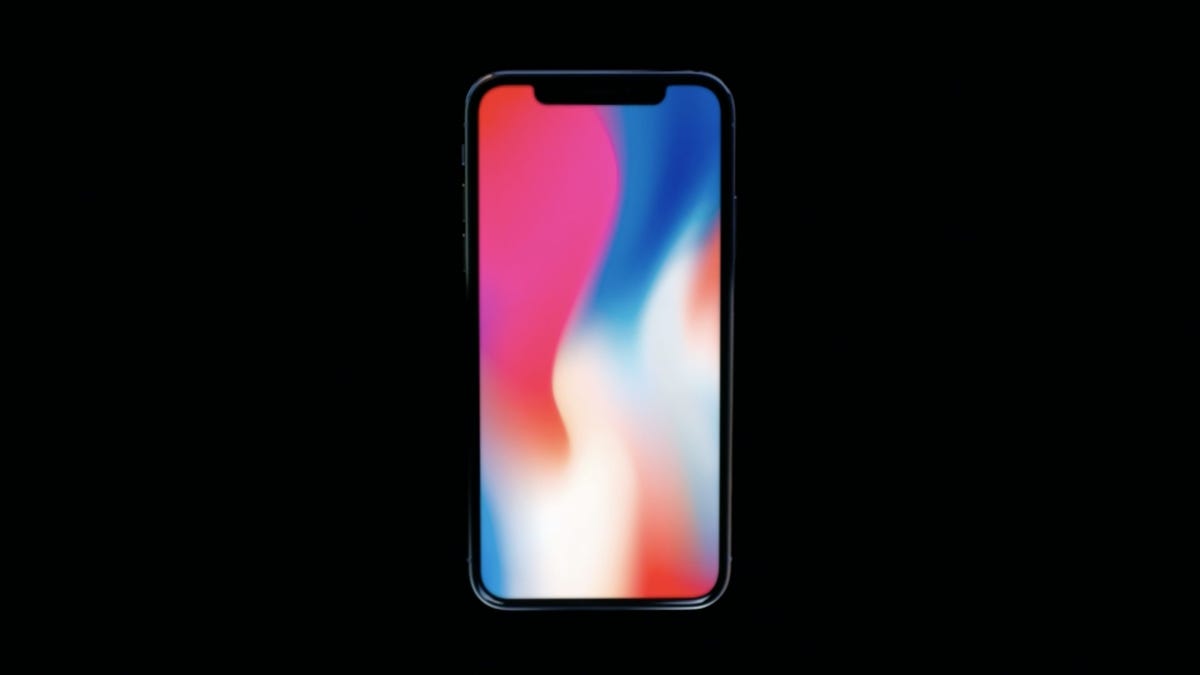Want to unlock the iPhone X? Just stare at it
Apple’s top-tier phone will use facial recognition to get you past the lock screen.

The iPhone X will have facial recognition features to unlock the device.
Smile! Apple just introduced a facial recognition system for its latest marquee phone.
The arrival of facial recognition on the new iPhone X signals a shift in how Apple fans can get access to their devices. Rather than tap your finger on the home button (which is gone), you simply look at the phone to get out of the lock screen via Face ID. Apple introduced the Touch ID fingerprint sensor as its primary unlock method four years ago.
The biometric security works by using the iPhone 's front-facing camera to register your facial structure as your password. That means that if someone who's not you -- or even your identical twin -- tries to unlock your iPhone, they'll be out of luck. It adds convenience to unlocking your device without lifting a finger.
"Nothing has ever been simpler or more natural," Phil Schiller, Apple's senior vice president of worldwide marketing, said at the unveiling, which took place Tuesday at the company's new Apple Park campus.
Apple isn't the first to use facial recognition to unlock devices. Samsung has had the feature since the Galaxy Note 7, and Microsoft has also used the face as a password on its Windows 10 devices. Facial recognition has its pitfalls though, as people showed you could easily trick cameras with pictures of somebody's face instead of the actual person.
To put its system in place, Apple added a new neural engine to the iPhone X, which can handle 600 billion operations a second. That'll help it process all the different factors when it's staring at your face. It'll be able to recognize you through different hairstyles, glasses, facial hair, lighting and other circumstances, according to Apple.
The facial recognition system also can adapt to your face as it changes over time, Apple said. It uses an infrared camera, a light sensor and a proximity sensor to scan your face, even in the dark.
The company said Face ID is about 20 times more secure than Touch ID.
But skeptics have already complained that holding your phone directly in front of your face may not be as natural a motion as placing your finger on the home button, an act we've practiced countless times each day.
Tuesday's announcement confirmed rumors that had been swirling for weeks. That's thanks to code mentioning the iPhone's facial recognition in Apple's HomePod, and a patent application in July for the biometric tech.
It's not clear yet if Apple's facial recognition will be easy to trick with a still photo, but we'll be testing that once we get our hands on the iPhone X. Apple said it worked to make sure that its scanners could not be tricked by pictures.
"They've even worked with professional mask makers in Hollywood to protect against spoofs," Schiller said.
The face data will be stored on Secure Enclave, which means it'll all be on your device instead of being sent to a distant server where it could be stolen.
Biometrics technology offers people a potentially easier and more convenient measure of security, providing a unique identifier without challenges like remembering passwords or protecting it from hackers. For cybercriminals, stealing a person's fingerprints or facial features can be more difficult than stealing passwords. The security feature also has its pitfalls, though -- law enforcement agencies can force people to unlock their phones via biometrics, but not through passwords.
Privacy still a priority
With its iOS 11 software, due later this month, Apple is bringing some subtle security updates to protect your privacy, which could frustrate the police.
The software update adds a safety feature by which iPhones can require a password through five clicks on the sleep button. The "Emergency SOS" mode would mean that law enforcement wouldn't be able to use biometrics to unlock your iPhone.
Apple has taken a strong stance to protect user privacy. It makes money from selling hardware and from services like iTunes, not from selling user data for things like targeted advertising. CEO Tim Cook has vowed time and again to maintain customer privacy for services such as the company's mobile payments service, Apple Pay . Neither merchants nor Apple store your credit card number, and Apple doesn't track what you've purchased.
The company ran into the biggest privacy battle of its history more than a year ago. It battled the US Justice Department to resist a court order to build a custom version of its iOS software to help the FBI unlock an iPhone 5C used in the San Bernardino, California, terrorist attack. While that suit was dropped, the bigger battle likely won't end anytime soon.
CNET's Shara Tibken contributed to this report.
Tech Enabled: CNET chronicles tech's role in providing new kinds of accessibility.
Logging Out: Welcome to the crossroads of online life and the afterlife.

